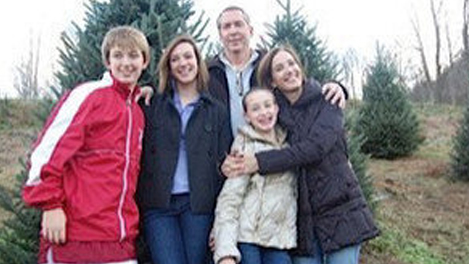CHARLOTTE, N.C. -- I love my job, says Ann Sheridan, 48, a reporter with WCNC-TV in Charlotte, because every day is different.
Sheridan moved to Charlotte in 1994, armed with a journalism degree from American University and several prior broadcasting jobs. She began working as a reporter for Channel 9 but she quit in 1996 when the station declined her request to work part-time after her daughter, Maria, was born.
She has been with Channel 36 ever since, working three days each week from 6 a.m. to 2 p.m. and devoting the rest of the time to her family (that also includes husband Steve, 55, and twins Julia and Jake, 13).
My job brings me to places I would never be otherwise, Sheridan says. I go to different neighborhoods and meet different people.
She has covered major local events, like the Susan Smith trial, Super Bowl XXXVIII and, most recently, the DNC ( a thrill, she says) and has won several prestigious awards for her writing and reporting.
Sheridan, a south Charlotte resident, comes up with her own stories, pursuing leads that interest her in the newspaper or from things she hears and sees out and about in the area that she thinks will be of interest to viewers.
She has also mined her own life for stories as well, most notably documenting her battle with breast cancer.
I resisted it at first, Sheridan recalls, because it felt self-serving.
She changed her mind thanks to the encouragement of her doctor, who said, You have to do this. Think of how many women you will help by telling your story.
Sheridan consulted with her family, knowing she d need their blessing to move forward because, she says, if I was going to do this, I was going to do it right. It would be invasive.
She and WCNC photographer Dan Robbins chronicled her illness, including her lumpectomy, her subsequent mastectomy of her right breast, and her recovery.
The public reaction was positive. She continues to field calls from women who have been diagnosed or are facing surgery and she regularly gives talks about her own cancer journey and the importance of regular mammograms for women older than 40. In addition, Carolina s Medical Center named a fund in her honor that provides mammograms to women who otherwise could not afford them.
I remain really proud of the reporting, Sheridan says. And she is proud of its impact. She remembers how touched she was by a photo her daughter, Maria, showed her of all of her friends clad in pink on the day of her surgery. She was not only touched by their support, but by how much sharing her cancer story had touched them.
I helped those girls understand that I am still the same person, with or without my breast, says Sheridan, and I have helped diffuse the issue of breast cancer for them.
Right before the series aired, Sheridan worried about how it would be received.
I had anxiety when it was coming out, she says, and I wondered if I had done the right thing.
For the many women who have been helped by the broadcasts, those seeking mammograms and treatment and future generations who now understand the importance of early detection, the answer is a resounding yes.


